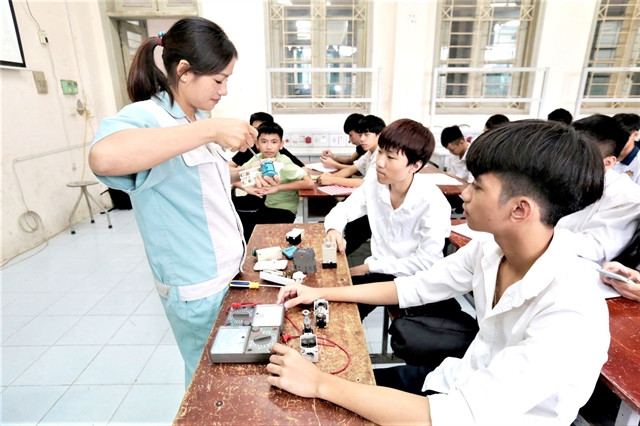 Students who graduated from secondary school attend an electricity class at Hanoi Industrial Vocational College. (Photo: VNA)
Students who graduated from secondary school attend an electricity class at Hanoi Industrial Vocational College. (Photo: VNA)Hanoi (VNS/VNA) - Few employers are engaged in the links among the Government,job trainers, employers and trainees’ families due to the lack of a bindingmechanism, vice director of Hanoi’s Department of Labour, Invalids andSocial Affairs Nguyen Thanh Nhan said.
Speaking ata recent meeting on the enrolment of vocational schools and colleges for thisschool year, Nhan said once employers’ involvement in job training wasenhanced, it would improve employment opportunities for trainees.
This year,21 public job training institutes in Hanoi hope to receive 18,735 studentsincluding nearly 8,000 students for college programmes which last two or threeyears and more than 10,700 students for vocational training programmes whichlast two years or less.
To date,more than 2,500 students have been admitted to job training college programmesand 6,500 students admitted to vocational school programmes.
It isexpected that by the end of next month, the city’s job training institutes willmeet or even exceed their enrolment targets.
Nhan saiddue to the COVID-19 pandemic, the schools faced difficulties in reachingstudents in conventional ways like face-to-face consultations or through schoolfairs. Instead, the schools used online approaches.
Withimproved budgets for education, many families now preferred to have theirchildren attend colleges or universities while many colleges/universities hadlowered their requirements to attract students, posing more difficulties forvocational schools, she said.
Nguyen ThanhLong, principal of the Hanoi Transportation Works Vocational School, saidthe school had enrolled more than 4,300 students for elementary level, twicethe figure expected.
“Most of thestudents are from rural or suburban areas, who want to work right aftergraduation,” Long said, adding that it was difficult to enrolstudents from urban areas or the city’s inner districts as they and theirfamilies preferred colleges or universities.
Pham Tien Dung,Principal of the Hanoi College of Electronic and Electro - RefrigeratoryTechnics, said thanks to improved communication and visible effective ofvocational training, students and their families had better understandingof vocational institutes.
However,many others were still sceptical or unaware of job training institutes,resulting in modest enrolment at many vocational schools.
“It isnecessary for schools to improve career orientation and job consultation duringenrolment,” Dung said.
“With properunderstanding about training programmes and jobs to work in future, studentswill be more interested in vocational training schools,” he said, adding thatabout 70 percent of the students admitted to his school learned about theschool through acquaintances who were alumni.
He said suchstudents could go to work during their first year at the school.
“To increaseenrolment, besides improved job orientation and consultation, the school alsoexpanded co-operation with employers, training students to fit with employers’requirements,”Dung said.
Nguyen CongTruyen, principal of the Vietnam–Korean Vocational College, said the cityshould have further communication to change public prejudice on vocationalschools, with more activities to honour students of vocational schools or skilledworkers.
The role ofemployers in training and creating jobs should be promoted, he said, addingthat almost all students graduating from departments like refrigeratortechnology, electrical and electronics, engineering or automobile technologyeasily got employed upon graduation.
Ngo Van Quy,Vice Chairman of the Hanoi People’s Committee, called on stakeholders toincrease communication about vocational training.
He askeddepartments of labour and education and training to work together in career orientationand consultation for students in secondary and high schools.
Thedepartments were also asked to teach students about vocational schools aswell as labour markets, particularly jobs the market has a high demand for.
The city’sDepartment of Planning and Investment was asked to review projects relating tovocational training so that proper resources would be given to the sector./.




























